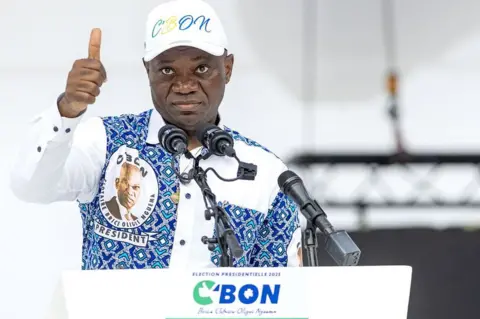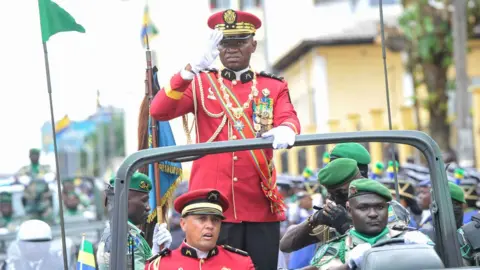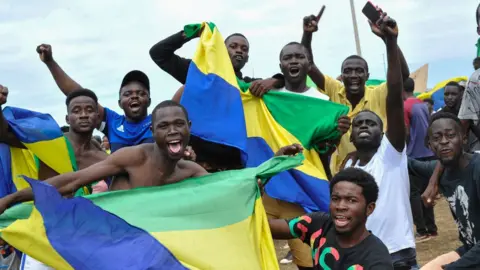Brice Oligui Nguema: Gabon's coup leader who stormed to election victory
 Getty Images
Getty ImagesAfter deposing Gabonese President Ali Bongo two years ago, Gen Brice Clotaire Oligui Nguema was carried through the streets by his triumphant troops, who chanted "Oligui, président! Oligui, président!".
The general certainly appeared to be a man of the people as he was held aloft by his soldiers, but to many, he was an unexpected leader. Now he has been handed a seven-year mandate after winning more than 90% of the vote in the first post-coup election.
Just five years ago, he barely existed in Gabon's public consciousness. He had spent 10 years outside the country after being dismissed from the inner circle of the Bongo family, who until August 2023 had ruled Gabon for almost 56 years.
On Gen Oligui Nguema's return, he quietly rose to the army's highest position. Now, after 19 months as interim head of state for the nation of over two million, he is the overwhelming favourite to win April's presidential election.
The 50-year-old has won praise for nationalising some foreign-owned oil assets, broadening the range of voices in political institutions by letting in opponents and civil society figures, boosting infrastructure and paying workers' outstanding pension arrears.
Of the five West and Central African nations that have endured coups since 2020, Oligui Nguema's Gabon is the only one to return to imminent civilian rule or maintain close relations with their former colonial power of France.
But Gabon remains heavily strained by debt, frequent power cuts, and complaints that the military men who staged the coup look set to remain in power despite promising to hand over to civilians.
Yet Oligui Nguema clearly remained broadly popular among a population relieved to be rid of dynastic rule, writes analyst Paul Melly, assisted by electoral regulations that disqualified some key challengers.
Equipped with a raft of presidential promises and a catchy campaign slogan "C'BON" - a play on his initials and the French word "c'est bon", meaning "it's good" - he approached these polls in ebullient form.
On occasion "(I've Got) The Power" blasted out on stage as he danced to the delight of supporters - quite the song choice for a man who seized power by force and now seeks legitimacy through the ballot.
Early ambition
Brice Oligui Nguema was born in the south-eastern province of Haut-Ogooué. The area is a stronghold of the Bongo family and some even say that Oligui Nguema is Ali Bongo's cousin.
Oligui Nguema took after his father and pursued a career in the military. At a very young age, he joined Gabon's powerful Republican Guard unit, having trained at Morocco's prestigious Meknes Royal Military Academy in 1997.
The ambitious young officer quickly attracted the attention of the military top brass and became an assistant to then-president Omar Bongo, Ali Bongo's father.
It is said Oligui Nguema was extremely close to Bongo senior - he served the autocrat until Omar Bongo's death in 2009.
"He's someone who wasn't expected [to lead Gabon] at this time," Edwige Sorgho-Depagne, an analyst of African politics who works for Amber Advisers, told the BBC's Newsday programme.
"In the 2000s, he was far from the country for some time... he was almost forgotten."
When Ali Bongo took over from his father in 2009, Oligui Nguema was dismissed from his job. But he was appointed as a military attaché and spent about 10 years in Morocco and Senegal.
Local media portray the general's long absence as an "exile", but a profile read out at his inauguration in September 2023 said that "his love for his country led him to take up a diplomatic career".
 EPA-EFE/REX/Shutterstock
EPA-EFE/REX/ShutterstockRegardless, the industrious military man reappeared on Gabon's political scene in 2018, when he replaced the president's step-brother as the Republican Guard's intelligence chief.
After just six months in the job, Oligui Nguema was promoted to head of the Republican Guard. He initiated reforms to make the unit more effective in its fundamental mission: maintaining the regime.
A former close collaborator told French news agency AFP that the general was at the time "a man of consensus, who never raises his voice, who listens to everyone and systematically seeks compromise".
The profile read out at the general's 2023 inauguration also gave hints of his character: He loves football and volleyball, speaks French and English, and is married with children.
Oligui Nguema also wants to be known as honest - in 2019 he launched the "clean hands" operation, which set out to tackle alleged state-led embezzlement.
However, the general was himself accused of hoarding public money.
In a 2020 investigation, US anti-corruption organisation OCCRP alleged that Oligui Nguema and the Bongo family had purchased expensive property in the United States with stashes of cash. The general was said to have spent $1m (£790,000) on three properties.
"I think whether in France or in the United States, a private life is a private life that [should be] respected," Oligui Nguema said in response.
 Rex/Shutterstock
Rex/ShutterstockBarely eight months before seizing power, Gabon's national news agency reported that Oligui Nguema had publicly reaffirmed his loyalty to Ali Bongo's presidency, which had stretched for 14 years.
But on 30 August 2023, just hours after Ali Bongo was announced as the winner of a disputed presidential election, the military announced it was annulling the results and taking over.
With the president under house arrest, General Brice Clothaire Oligui Nguema was sworn in as Gabon's interim president.
The general told France's Le Monde newspaper that the Gabonese people had had enough of Ali Bongo's rule, and that the president should not have run for a third term.
"Everyone talks about this but no-one takes responsibility," he said. "So the army decided to turn the page."
The UN, the African Union and France condemned the coup - the eighth to take place in West and Central Africa since 2020.
But Oligui Nguema seems to have won over large parts of the public. He has also succeeded in uniting the army, which has been divided along ethnic lines.
Ahead of his election, he pledged to diversify the economy, make government more efficient, toughen housing regulation and incentivise the return of Gabonese people living in the diaspora. Many of these promises would build on progress already made by his administration, which has been keen to show it is cracking down on bureaucratic excess.
As a man who has been accused of corruption and has spent most his career in the Bongos' inner circle, he is still striving to deliver the fresh start the Gabonese people desire.
No matter how that project ends, he will forever be etched in the country's history books as the man who "turned the page".
Additional reporting by Alison Onyango
